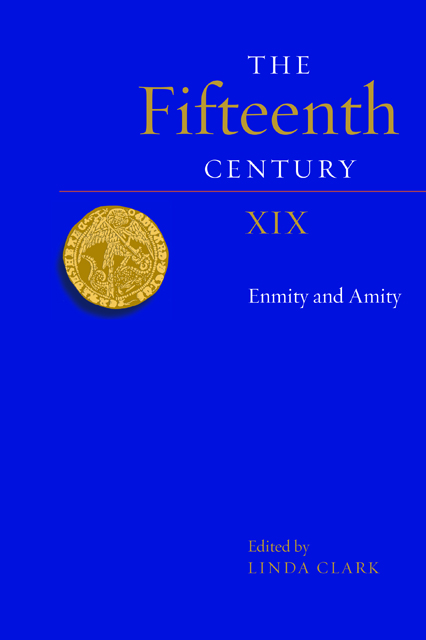Book contents
- Frontmatter
- Contents
- List of Contributors
- Preface
- List of Abbreviations
- England and Europe, c.1450–1520: Nostalgia or New Opportunities?
- Mariners and Marauders: A Case Study of Fowey during the Hundred Years’ War, c.1400–c.1453
- Henry V’s Army of 1417
- ‘Get out of our land, Englishmen’. French Reactions to the English Invasion of 1512–13
- Encountering the ‘Duche’ in Margery Kempe’s Lynn
- ‘C’est le Beaulté de Castille et d’Espaigne, qui le Soleil cler d’Austrice accompaigne’: Jean Molinet makes the Habsburgs Burgundian
- Magna Carta in the Late Middle Ages, c.1320–c.1520
- The Business of the Southern Convocation in 1462
- Index
- Contents of Previous Volumes
Encountering the ‘Duche’ in Margery Kempe’s Lynn
Published online by Cambridge University Press: 20 December 2022
- Frontmatter
- Contents
- List of Contributors
- Preface
- List of Abbreviations
- England and Europe, c.1450–1520: Nostalgia or New Opportunities?
- Mariners and Marauders: A Case Study of Fowey during the Hundred Years’ War, c.1400–c.1453
- Henry V’s Army of 1417
- ‘Get out of our land, Englishmen’. French Reactions to the English Invasion of 1512–13
- Encountering the ‘Duche’ in Margery Kempe’s Lynn
- ‘C’est le Beaulté de Castille et d’Espaigne, qui le Soleil cler d’Austrice accompaigne’: Jean Molinet makes the Habsburgs Burgundian
- Magna Carta in the Late Middle Ages, c.1320–c.1520
- The Business of the Southern Convocation in 1462
- Index
- Contents of Previous Volumes
Summary
The launch in 2015 of the England’s Immigrants 1330–1550 online database has given fresh impetus to research into the presence of aliens – people born outside the realm – in late medieval England. Some recent studies have taken up a challenge set half a century earlier by Sylvia Thrupp, in a pioneering analysis of the first alien subsidy of 1440. She advocated examining particular communities, and tracing individuals within them, in order better to understand the extent and pace of integration of first-generation immigrants, noting that the alien subsidy records ‘require to be collated with town records and with court records of all kinds’. Inevitably, this is a path largely dependent on the survival of local records, and the authors of recent studies of alien communities in London, Great Yarmouth and Exeter have all been able to exploit urban archives of exceptional quality. Among common threads which have emerged are the varying dynamics of the relationships between resident aliens and the enfranchised citizens or freemen, between freemen and other, non-alien, inhabitants, and between alien craftsmen and their English counterparts. In fifteenth-century Exeter, for example, aliens were admitted to the freedom and thereafter were eligible for civic office; in Great Yarmouth they were excluded altogether (in practice, if not formally) from a narrowing community of burgesses. Aliens faced increasing levels of regulation and restriction during the fifteenth century, but their experience of exclusion was also one shared, in part, with other non-burgess town dwellers. This is particularly evident in London, where some guild ordinances explicitly placed aliens together in the same category with other, non-alien, incomers to the city. Similar factors were at play in Lynn, where measures specifically targeted at aliens were introduced during a period of recurring tension between different levels of urban society as a whole.
In early fifteenth-century Lynn, as in Great Yarmouth, the immigrant community was dominated by people described as ‘Duche’. This problematic label, which is commonly, but perhaps confusingly, rendered into modern English as ‘Dutch’, was attached to ‘a wide range of people from the Low Countries and north-west Germany’, but in Lynn it was also applied to immigrants from the eastern territories settled by Germans in the thirteenth and fourteenth centuries.
- Type
- Chapter
- Information
- The Fifteenth Century XIXEnmity and Amity, pp. 90 - 112Publisher: Boydell & BrewerPrint publication year: 2022

